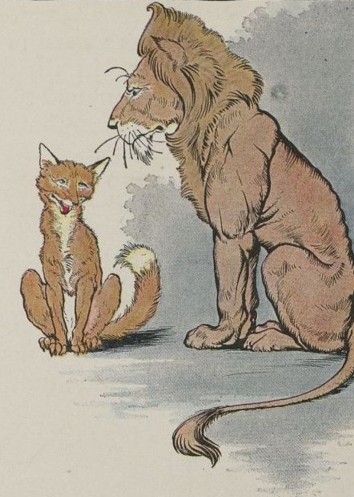PART A_1
Let’s learn vocabulary. Listen and repeat the words and the sentences with your tutor.
PART A_2
| 1. slink | /slingk/ |
| -to walk away from somewhere quietly so that you are not noticed | |
| The prey slinked away from its predator. | |
| 2. acquaintance | /uh-KWEYN-tns/ |
| -someone that you have met but do not know well | |
| Harold met new acquaintances at the party. | |
| 3. contempt | /kuhn-TEMPT/ |
| -a strong feeling of disliking and having no respect for someone or something | |
| She doesn’t feel anything but contempt toward him. | |
| 4. breed | /breed/ |
| -to cause something to happen, usually something bad | |
| Envy breeds hate and anger. | |
| 5. boldly | /bohld-lee/ |
| -in a brave and confident way, without showing any fear | |
| He acted boldly as a hero while chasing the thief. |
PART B_1
Let’s read the story. Please read them aloud, and I will check your pronunciation and intonation.
PART B_2
The Fox and the Lion

A very young Fox, who had never before seen a Lion, happened to meet one in the forest. A single look was enough to send the Fox off at top speed for the nearest hiding place.
The second time the Fox saw the Lion he stopped behind a tree to look at him a moment before slinking away. But the third time, the Fox went boldly up to the Lion and, without turning a hair, said, “Hello, there, old top.”
Familiarity breeds contempt.
The second time the Fox saw the Lion he stopped behind a tree to look at him a moment before slinking away. But the third time, the Fox went boldly up to the Lion and, without turning a hair, said, “Hello, there, old top.”
Familiarity breeds contempt.
Acquaintance with evil blinds us to its dangers.
PART C_1
Let’s answer comprehension questions. Please answer them based on the story.
PART C_2
| 1. | What happened when the Fox saw the Lion for the first time? |
| 2. | What did the Fox do on its second encounter with the Lion? |
| 3. | How did the Fox respond after seeing the Lion for the third time? |
PART D_1
Let’s discuss the story. Please answer the questions below and express your opinions.
PART D_2
| 1. | What made the Fox approach the Lion without turning a hair? |
| 2. | What do you think happened to the Fox after its third encounter with the Lion? |
| 3. | Do you agree with the fable’s lesson? Why or why not? |
| 4. | How should we deal with strangers? Please explain your answer. |
| 5. | Could you think of a life situation where this is applicable? Please tell me about it. |
REVIEW AND FEEDBACK
Now, let us review the things that you learned in this lesson.
ではこのレッスンで学んだことを振り返りましょう。
(Please give a short feedback on how your student did on your class.)
| Grammar 文法 |
Pronunciation 発音 | Vocabulary 単語 |
Comprehension 理解 |
|
|---|---|---|---|---|
 GOOD GOOD |
文法の誤りはほとんどなく、完全な文章で話すことができる | ほとんどの単語をはっきりと正しく発音することができる | 習った表現を適切に使うことができる | 文章を理解し、質問に正しく答えることができる |
 FAIR |
文法の誤りはあるが、完全な文章で話すことができる | 発音の練習が必要な言葉がいくつかある | たまにミスはあるが、習った表現を適切に使うことができる | 文章を完全に理解するのは難しく、質問に正しく答えられないときもある |
 POOR |
文章で話すのは難しく、単語だけで話すことができる | 発音の練習が必要である | 習った単語と表現を少しだけ使うことができる | 文章を理解するのは難しく、質問に答えるのは難しい |
Parts of this lesson material are based on:
An eBook from The Project Gutenberg.
This eBook is for the use of anyone anywhere at no cost and with almost no restrictions whatsoever. You may copy it, give it away or re-use it under the terms of the Project Gutenberg License included with this eBook or online at www.gutenberg.org
An eBook from The Project Gutenberg.
This eBook is for the use of anyone anywhere at no cost and with almost no restrictions whatsoever. You may copy it, give it away or re-use it under the terms of the Project Gutenberg License included with this eBook or online at www.gutenberg.org